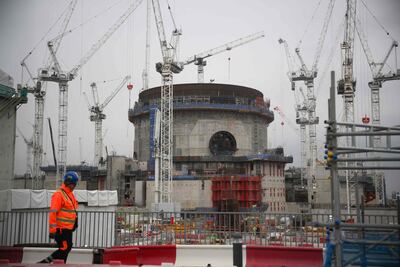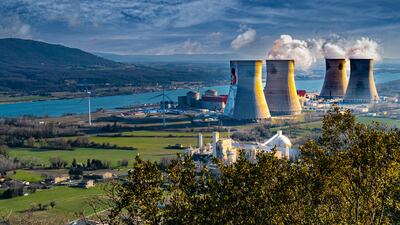As someone who grew up on the coast in Cumbria, the UK’s world leadership in nuclear power was drummed into us from an early age.
Not far from where we lived, along the Irish Sea shoreline, was the vast Sellafield nuclear complex. Formerly known as Windscale, it included Calder Hall, the world’s first commercial nuclear power station, which went on-stream in 1956.
We were taught how Sellafield was world-beating and revolutionary, and while there was the danger of a nuclear accident, the chances of a serious leak were tiny and we should focus on British innovation and the contribution made to the nation’s electricity supply.
Sellafield very much still exists. It’s Europe’s largest nuclear site, covering 263 hectares (650 acres). But no power generation has taken place there since 2003; instead, today, it focuses on nuclear decommissioning, waste processing and storage.
If anything summed up the backwards direction of British energy policy over recent decades, it is Sellafield. No nuclear power station has been built in Britain since Sizewell B in 1995; electricity production from nuclear has fallen from 25 per cent to 15 per cent; of the five nuclear power stations presently operating, four are due to be decommissioned by 2028.
Rather than construct its own power stations, Britain has preferred to import to meet its energy needs, with the result that a country that should be perfectly capable of looking after itself, and had a head start on everyone else, is at the mercy of the markets.
If there is a shock to the system, as there was when Russia invaded Ukraine and energy supplies were switched off, then Britain is stuck, vulnerable to a lack of capacity and forced to pay high international prices.

It is a damning indictment of successive governments — Tory, Labour and coalition — and the short-termism, not to mention the nimbyist and blinkered approach of our politicians, that we find ourselves in this mess.
The Britain that lectured its children on the country’s genius where nuclear energy was concerned now looks across the Channel, to France, with envy.
Not that the new Energy Security Secretary is downcast. Adopting the boosterism that has become a hallmark of the Tories, first under Boris Johnson, then briefly Liz Truss and now Rishi Sunak, the minister, Grant Shapps, declares: “My very simple objective is to create the economy with the cheapest wholesale electricity price by 2035. That’s what I’m all about. Let’s have Britain with the cheapest energy in Europe.”
To which there are two replies: wow and how?
Nuclear UK

The fact he is no longer called Energy Secretary but Energy Security Secretary speaks volumes. But let’s concentrate on his claim. Rightly, Shapps says “the most successful economies in the world are the ones that have cheap energy prices”.
They’re the ones that meet their own requirements and do not have to run up import costs. For Britain that would have been largely achieved if we’d stuck with, and expanded, nuclear. But we didn’t and now we’re literally paying the price.
Johnson launched Great Britain Nuclear or GBN, with the aim of building a new reactor every year for a decade.
GBN would triple domestic nuclear production to 24GW by 2050, meeting a quarter of the demand for electricity. Eight large new reactors are due to be constructed, along with the two already under way, Sizewell C and Hinkley Point C.
This does not come cheap: Sizewell C will cost about £30 billion ($37.6 billion) and Hinkley Point C £33 billion. Hence, the UK government is going cap in hand to Gulf countries and their sovereign wealth funds.
Norway, with its enormous fund, is also on the Shapps shopping list. But progress here is slow. There is fierce competition, too, for their money.
There is a distinct lack of speed, also, when it comes to the actual planning and building. Delays to national infrastructure projects are in Britain’s DNA. Unless Shapps can change fundamental attitudes, that GBN nuclear target set by Johnson appears unattainable.
Included in the GBN plan were smaller nuclear reactors to be supplied by Rolls-Royce. The time frame for their delivery appears to be slipping as well, as typically process and tendering take charge.
France winning race

As well as nuclear, Shapps is looking to wind and solar to plug the gap. Here he is on stronger ground, especially where wind is concerned. Britain currently boasts the world’s three largest offshore wind farms and a fourth will soon be up and running. Johnson set a goal of 50GW from offshore turbines by 2030, up from 14GW at present. In fact, there is 76GW in the pipeline.
Onshore wind and solar are less productive and more difficult to implement on a large scale, thanks to local planning constraints.
None of this can operate in isolation. If it is to have any chance of succeeding in ceasing to import but also offering the cheapest energy, then Britain must draw economic firepower.
In today’s connected world, that means convincing green energy and electric-vehicle funders to choose Britain over elsewhere.
Here it is in a dogfight, and not only with the US, which has passed its Inflation Reduction Act containing $369 billion of subsidies aimed at incentivising green energy and electric carmakers.
Not content with its lead in nuclear, France has just landed the contract for ProLogium’s first overseas car battery plant, a giant gigafactory to be built at Dunkirk.
The mammoth plant will produce batteries on a large scale. It’s the Taiwanese company’s first overseas manufacturing venture and becomes the fourth such plant in the northern French port city, creating a specialist “cluster” devoted to the electric car industry.
President Macron’s government pulled out all the stops to win the deal, lobbying hard and throwing in all manner of sweeteners to see off the Netherlands and Germany.
Britain was not in the running. Where once it was far out in front, it’s not any more. We have a lot of catching up to do.


